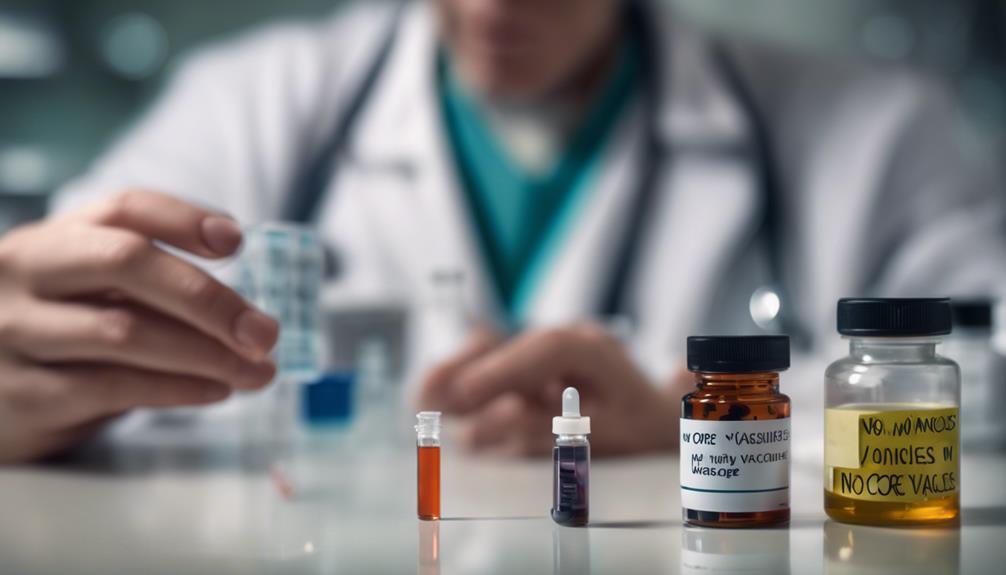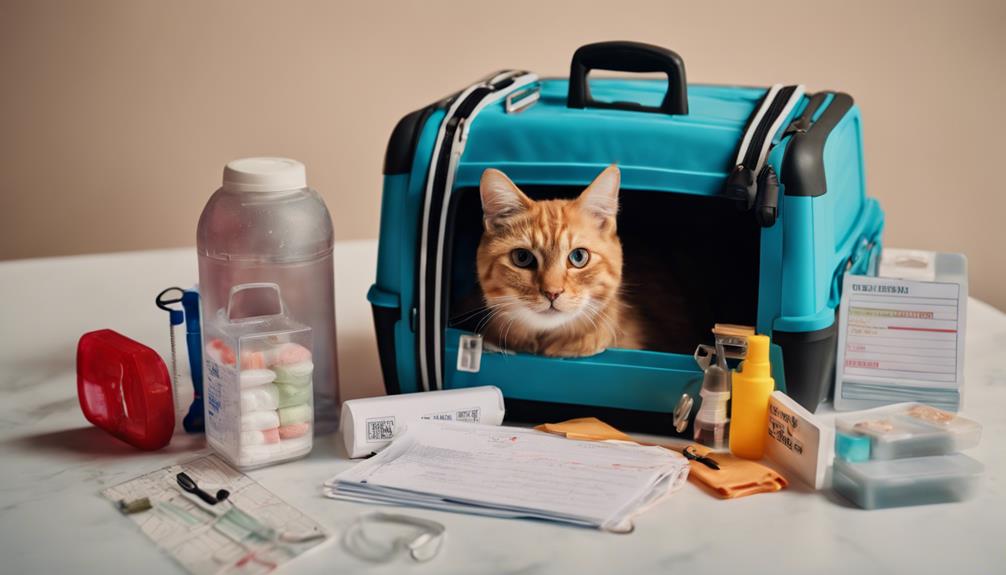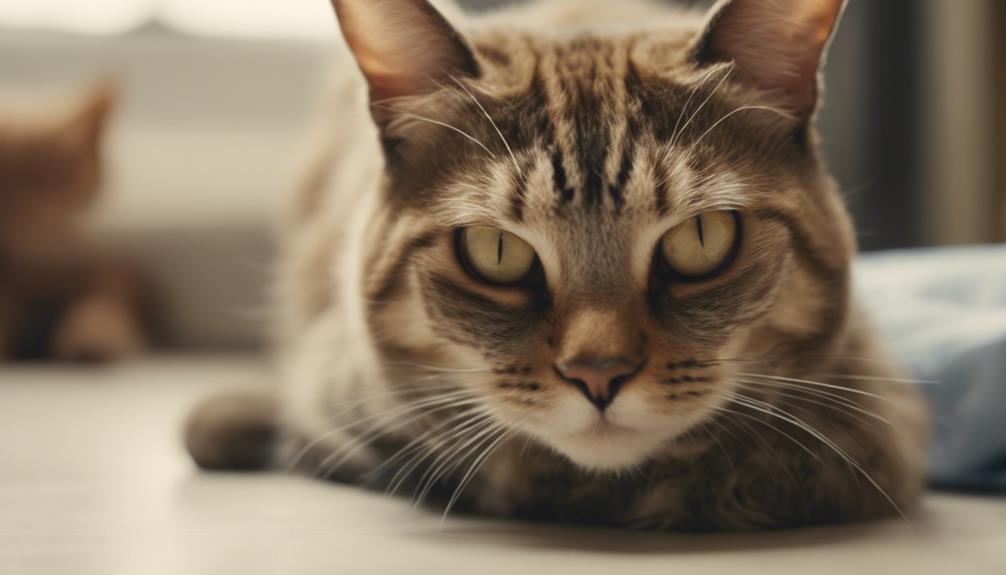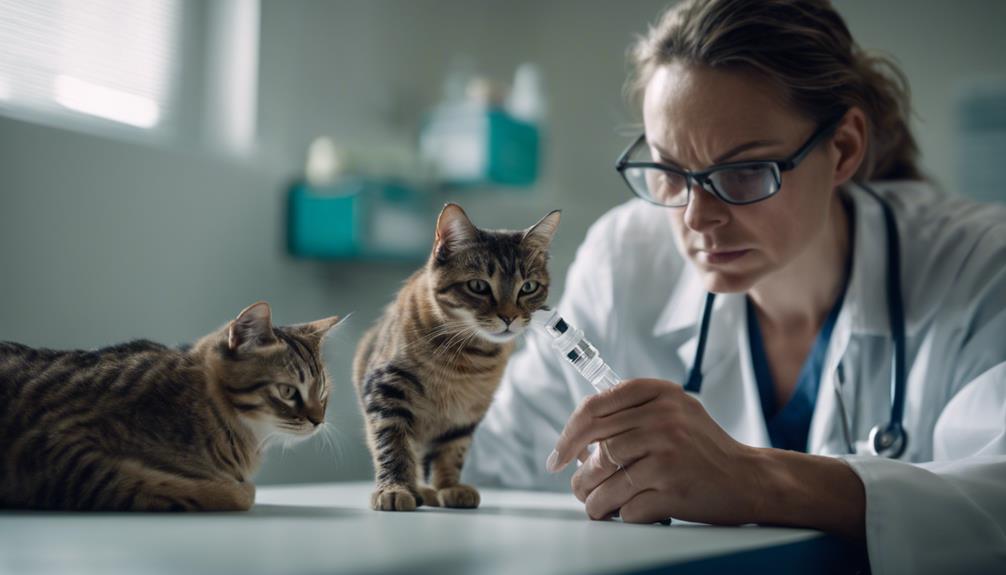Understanding the significance of cat vaccinations goes beyond mere routine care; it is a crucial pillar in maintaining your feline companion's health and well-being. From core vaccines that shield against prevalent diseases to non-core vaccinations tailored to individual risks, the realm of feline immunization is multifaceted.
However, what exactly do these shots entail, and what can cat owners anticipate during and after their cat's vaccination appointment? Let's explore the essential shots recommended for cats and delve into what to expect throughout the vaccination process.
Key Takeaways
- Core cat vaccinations protect against fatal diseases like rabies and feline distemper.
- Non-core vaccines target specific risks like respiratory infections and feline immunodeficiency virus.
- Vaccination schedules consider health, age, and lifestyle to tailor protection for each cat.
- Post-vaccination, monitor for common side effects and seek immediate care for severe reactions.
Importance of Cat Vaccinations
Cat vaccinations play a crucial role in safeguarding feline health by preventing the spread of contagious diseases and protecting both cats and humans from potentially fatal illnesses. By immunizing cats against a variety of diseases, vaccinations not only enhance their quality of life but also contribute to public health by reducing the risk of zoonotic diseases.
These preventive measures are essential in ensuring that our feline companions lead long, healthy lives free from the suffering caused by preventable illnesses. Through timely vaccinations, we can create a shield of protection around our beloved pets, offering them the best chance at a vibrant and thriving existence.
Embracing the importance of cat vaccinations is a fundamental step in promoting the well-being of our feline friends.
Core Vaccines for Cats
When considering the essential vaccinations for felines, the core vaccines prescribed by veterinarians are fundamental in preventing the spread of potentially life-threatening diseases. These vaccines provide crucial protection against common and severe illnesses.
The core vaccines for cats include:
- Rabies Vaccine:
- Zoonotic disease transmitted by infected animal bites.
- Almost always fatal once symptoms appear.
- Required by law in most U.S. states.
- Feline Viral Rhinotracheitis Vaccine:
- Caused by feline herpesvirus 1.
- Symptoms include respiratory issues, eye, and nose irritation.
- Feline Calicivirus Vaccine:
- Causes upper respiratory disease and mouth ulcers.
- Feline Panleukopenia Vaccine:
- Also known as feline distemper or parvo.
- Feline Leukemia Vaccine:
- Spread through infected fluids like saliva.
- Affects up to 3% of U.S. cats.
Non-core Vaccines Overview

Exploring additional layers of protection beyond the core vaccines, non-core vaccinations for cats target specific health concerns based on individual risk factors and exposure. These vaccines are recommended based on factors such as lifestyle, environment, and potential disease exposure. Here is an overview of some common non-core vaccines for cats:
| Vaccine Name | Transmission | Health Concern |
|---|---|---|
| Chlamydophila Felis | Direct cat-to-cat contact | Eye inflammation, respiratory issues |
| Bordetella Bronchiseptica | Airborne or direct contact | Upper respiratory problems |
| Feline Immunodeficiency Virus | Saliva, often via bites | Immune system suppression |
Discuss these options with your veterinarian to determine the best vaccination plan for your feline companion.
Understanding Vaccination Schedules
Developing a well-structured vaccination schedule is crucial for maintaining your cat's optimal health and protection against preventable diseases. Understanding vaccination schedules involves the following key points:
- Tailored to your cat's health, age, lifestyle, and location.
- Core vaccines are generally recommended for all cats.
- Non-core vaccines depend on exposure risk and health status.
- Veterinarians play a vital role in determining the appropriate vaccine needs.
- Regular reviews and adjustments of the vaccination schedule are essential to ensure continuous protection for your feline companion.
Tips for Vet Visit Preparation

Understanding the importance of preparing your cat for a vet visit is essential for ensuring a positive and stress-free experience for both you and your feline companion. Start by introducing the carrier gradually and making it a cozy space with familiar items to reduce anxiety. Positive reinforcement can help your cat associate the carrier with positive experiences.
Consider using pre-visit medication if your cat is prone to stress or anxiety. Additionally, gather all necessary documents and information about your cat's medical history to share with the veterinarian. By taking these steps, you can help make the vet visit less daunting for your cat and increase the chances of a successful and productive appointment.
Managing Post-Vaccination Symptoms
After receiving vaccinations, monitoring for common side effects is crucial in ensuring your cat's well-being. Some post-vaccination symptoms are expected and can be managed at home with proper care and attention. Here are some tips for managing post-vaccination symptoms:
- Provide a warm and quiet space for your cat to rest.
- Offer extra love and attention to comfort your cat.
- Ensure access to fresh water and food.
- Monitor your cat's behavior closely for any unusual changes.
- Contact your veterinarian if you notice persistent or severe symptoms.
Recognizing Severe Reactions

Upon administering vaccinations to your cat, it is imperative to be vigilant in identifying any signs of severe reactions that may necessitate immediate veterinary intervention. While most cats tolerate vaccines well, some may experience severe reactions requiring prompt attention.
Watch for symptoms such as persistent vomiting, diarrhea, difficulty breathing, facial swelling, hives, or collapse. These signs could indicate a severe allergic reaction or anaphylaxis, which are medical emergencies. Additionally, observe your cat's behavior for unusual lethargy, weakness, or prolonged discomfort.
If you notice any concerning signs post-vaccination, contact your veterinarian immediately. Quick recognition and intervention are crucial in managing severe reactions and ensuring your cat's health and well-being.
Injection Site Monitoring
Effective monitoring of the injection site following cat vaccinations is essential to ensure proper healing and detect any potential issues promptly. Here are some key points to consider:
- Inspect the Injection Site: Regularly check the area for any abnormalities, such as swelling, redness, or discharge.
- Monitor Behavior Changes: Keep an eye on your cat for signs of discomfort, such as excessive licking or reluctance to be touched.
- Note the Size of the Lump: It's normal to have a small, temporary lump at the injection site, but if it grows or persists, consult your veterinarian.
- Keep Records: Document any changes in the injection site appearance or your cat's behavior to track progress.
- Consult Your Veterinarian: If you notice any concerning developments, seek professional advice promptly to address any issues effectively.
Common FAQs About Cat Vaccinations

Answering common questions about cat vaccinations is essential for ensuring pet owners are informed about their feline companions' health needs.
One frequently asked question is whether indoor cats need vaccinations. Even indoor cats can benefit from vaccinations to protect against potential exposure to diseases.
Another common query revolves around the frequency of vaccinations. Vaccination schedules can vary based on the cat's age, health status, and lifestyle, so it's best to consult with a veterinarian to determine the appropriate timeline.
Owners often wonder about the safety of vaccines. While vaccines can cause mild side effects like lethargy or soreness, severe reactions are rare. Monitoring your cat post-vaccination and seeking immediate veterinary care for any concerning symptoms is crucial for their well-being.
Conclusion: Keeping Your Cat Healthy
To ensure the ongoing health and well-being of your feline companion, it is imperative to prioritize preventive care measures and maintain a vigilant approach towards their overall health. Here are essential tips for keeping your cat healthy:
- Provide a balanced diet tailored to their specific needs.
- Engage in regular playtime to keep them mentally and physically active.
- Schedule routine veterinary check-ups to catch any potential issues early.
- Keep their environment clean and enriched to prevent stress and boredom.
- Show them love and affection to strengthen your bond and promote their well-being.
Frequently Asked Questions
Can My Cat Receive Too Many Vaccinations at Once, and What Are the Risks Associated With Over-Vaccination?
Administering multiple vaccinations to cats simultaneously can overload their immune system, leading to potential adverse reactions. Risks of over-vaccination include allergic reactions, autoimmune disorders, and injection site tumors. Consult with your veterinarian to develop a safe vaccination schedule.
Are There Any Alternative Methods or Supplements That Can Help Boost My Cat's Immune System in Addition to Vaccinations?
Alternative methods and supplements to boost a cat's immune system can include a balanced diet, regular exercise, proper grooming, and stress management. Consult with a veterinarian to explore additional options like probiotics, immune-boosting supplements, and herbal remedies.
How Long Do Cat Vaccinations Typically Provide Protection, and Is There a Way to Test My Cat's Immunity Levels?
Cat vaccinations typically provide protection for varying durations, generally ranging from 1 to 3 years. Veterinarians can conduct blood tests to assess your cat's immunity levels. Regular vet check-ups help ensure ongoing protection against preventable diseases.
Are There Any Specific Factors or Conditions That May Prevent My Cat From Being Vaccinated, and How Can I Manage Their Health in These Cases?
Certain factors, like severe illness or immunocompromised status, may prevent cat vaccinations. In such cases, consult with a veterinarian for tailored health management strategies. Regular check-ups and preventive care can help maintain your cat's well-being in these circumstances.
Are There Any Ongoing Research or Developments in the Field of Feline Vaccinations That Pet Owners Should Be Aware Of?
Ongoing research in feline vaccinations focuses on improving vaccine efficacy and duration, reducing adverse effects, and developing new vaccines. Pet owners should stay informed through their veterinarians to ensure their cats receive the most up-to-date protection.
Does a Cat’s Third Eyelid Affect Their Vaccination Schedule?
The presence of a cat’s third eyelid, which offers protective and health cats third eyelid insights, generally doesn’t alter their vaccination timetable. Regular check-ups, however, are key to ensure it indicates no underlying health issues that could impact vaccine efficacy or schedule. Always consult a veterinarian for tailored advice.
Conclusion
In conclusion, ensuring that cats receive proper vaccinations is crucial for safeguarding their health and preventing the spread of infectious diseases. By understanding the importance of core vaccines, following vaccination schedules, and being prepared for vet visits, cat owners can contribute to their pet's well-being.
Monitoring for any severe reactions and following post-vaccination care guidelines are essential in maintaining a healthy feline companion.




